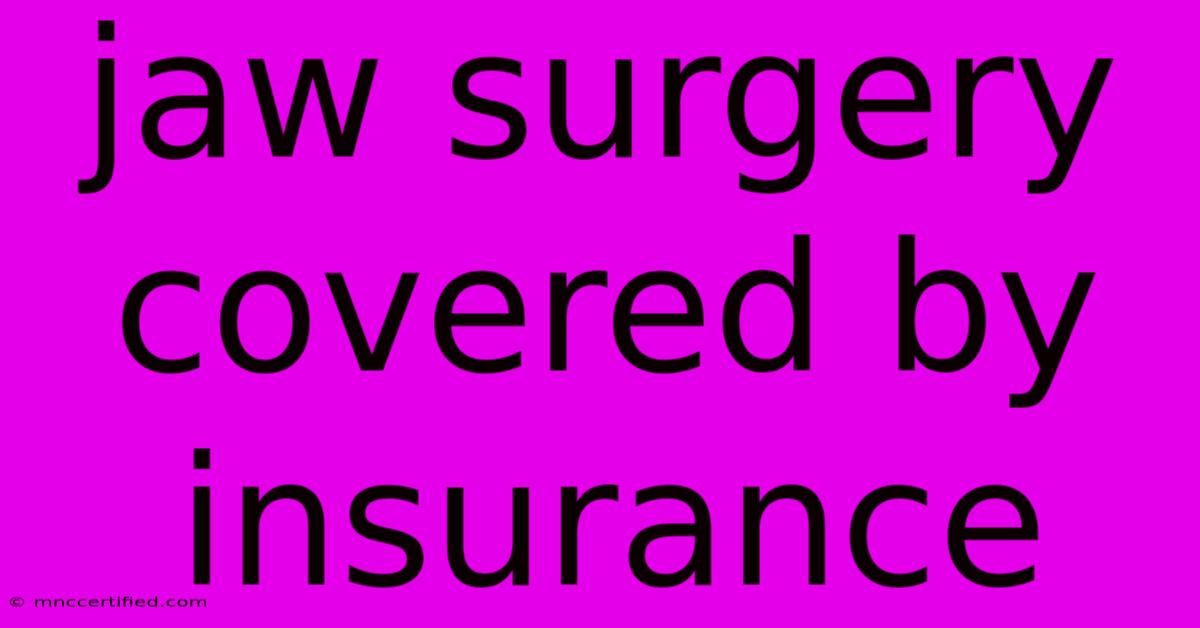Jaw Surgery Covered By Insurance

Table of Contents
Jaw Surgery Covered by Insurance: A Comprehensive Guide
Navigating the complex world of insurance coverage for jaw surgery can be daunting. This comprehensive guide will help you understand what factors influence coverage, how to maximize your chances of approval, and what to expect throughout the process. We'll cover various types of jaw surgery, common insurance roadblocks, and strategies for successful claims.
Understanding Your Insurance Policy
Before even considering jaw surgery, thoroughly review your dental and medical insurance policies. Look for specific wording regarding:
- Orthodontic coverage: Many policies cover orthodontics, but the extent of coverage varies drastically. Jaw surgery often requires orthodontic treatment before and after, so this is crucial.
- Surgical procedures: Identify the specific types of surgeries covered. Look for terms like "orthognathic surgery," "maxillofacial surgery," or "TMJ surgery."
- Pre-authorization requirements: Most insurers require pre-authorization for elective surgeries like jaw surgery. Failing to obtain this can lead to significant out-of-pocket expenses.
- Network providers: Using in-network providers (doctors and facilities participating in your insurance plan) often results in lower costs and streamlined billing.
- Benefit limits: Understand the annual and lifetime maximums your plan offers. Jaw surgery can be expensive, so exceeding these limits is a significant concern.
Types of Jaw Surgery and Insurance Coverage
Several types of jaw surgery exist, each with varying chances of insurance coverage:
- Orthognathic surgery: This corrects misalignments of the jaws. Coverage is more likely if the surgery addresses a functional issue like difficulty chewing, breathing, or speaking, rather than purely cosmetic concerns. Medical necessity is key here.
- TMJ surgery (Temporomandibular Joint surgery): This addresses problems with the jaw joint, often causing pain and limited movement. Coverage depends on the severity of the condition and whether conservative treatments have been exhausted.
- Impacted wisdom teeth removal: Often covered if medically necessary due to infection, pain, or damage to adjacent teeth. However, purely elective removal may not be covered.
Maximizing Your Chances of Insurance Coverage
Several strategies can increase your odds of getting your jaw surgery covered:
- Obtain a thorough diagnosis: A detailed medical diagnosis highlighting the functional impact of your jaw misalignment is crucial. Your surgeon's documentation should emphasize the medical necessity of the surgery.
- Document conservative treatment attempts: If you’ve tried other, less invasive treatments (like orthodontics alone) without success, document this in your medical records. This demonstrates that surgery is a last resort.
- Choose an in-network provider: Working with surgeons and facilities within your insurance network simplifies billing and often leads to lower out-of-pocket costs.
- Understand pre-authorization procedures: Follow your insurer's guidelines for pre-authorization meticulously. Incomplete or late submissions can delay or deny coverage.
- Appeal denials: If your claim is denied, don't give up. Thoroughly review the denial reason and prepare a well-documented appeal, possibly with assistance from your surgeon's office.
Addressing Common Insurance Roadblocks
- Cosmetic vs. Functional: Insurance companies prioritize covering functional issues. Clearly establish the functional impairments caused by your jaw misalignment.
- Pre-existing conditions: Pre-existing conditions might affect coverage, but a strong case for medical necessity can often overcome this.
- Lack of documentation: Incomplete or poorly documented medical records are a common cause of denial. Ensure your surgeon provides comprehensive documentation.
Financial Planning for Jaw Surgery
Even with insurance coverage, significant out-of-pocket expenses are likely. Consider:
- Payment plans: Many surgical centers offer payment plans to help manage costs.
- Health savings accounts (HSAs): If eligible, utilize HSA funds to cover medical expenses.
- Crowdfunding: Explore platforms like GoFundMe to seek financial assistance from family, friends, and the wider community.
Getting jaw surgery covered by insurance requires proactive planning and detailed documentation. By understanding your policy, working closely with your surgeon, and meticulously addressing insurance requirements, you significantly increase your chances of successful coverage. Remember to always verify information directly with your insurance provider.

Thank you for visiting our website wich cover about Jaw Surgery Covered By Insurance. We hope the information provided has been useful to you. Feel free to contact us if you have any questions or need further assistance. See you next time and dont miss to bookmark.
Featured Posts
-
Triton General Insurance Payment
Nov 21, 2024
-
Cheap Auto Insurance Pasadena Tx
Nov 21, 2024
-
Apartment Complex Insurance Cost
Nov 21, 2024
-
33 66 An Hour Is How Much A Year
Nov 21, 2024
-
Check Pa Roads Penn Dots Website
Nov 21, 2024